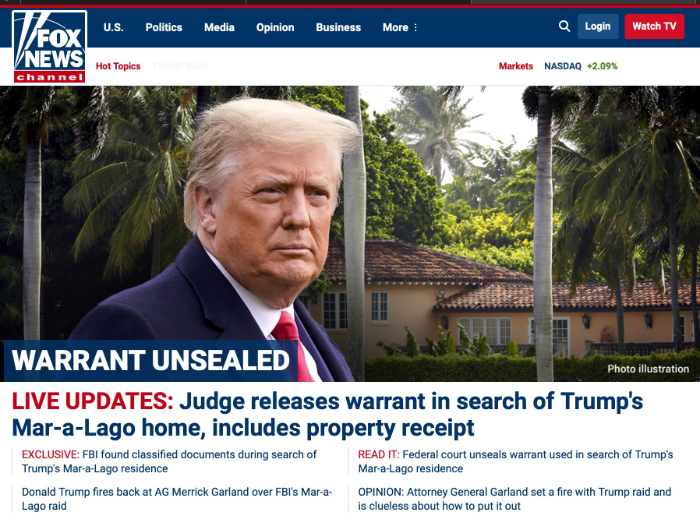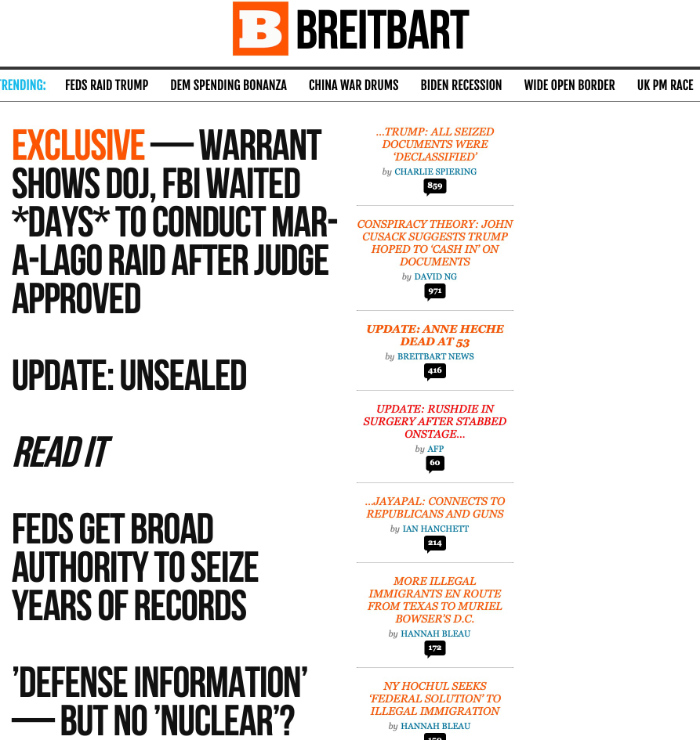• Saturday Q&A
• House Passes Inflation Reduction Act
Mar-a-Lago Warrant Unsealed
Yesterday, 3:00 p.m. ET came and 3:00 p.m. ET left without Donald Trump asserting his right to keep secret the search warrant that was served against his estate at Mar-a-Lago. And so, shortly after the deadline imposed by Judge Bruce E. Reinhart, the warrant and the inventory of items seized were made public. You can see them here, if you wish.
Let's start by reviewing the two most important unknowns here. First, the precise nature and contents of the documents taken from Mar-a-Lago is largely a mystery. The inventory does include a few specifics, including a document related to the pardon of Roger Stone and "Info re: President of France" (presumably Emmanuel Macron). However, most things are listed in the inventory in very general terms, like "Box labeled A-1" or "Miscellaneous Secret Documents."
The other important unknown is whether or not Trump is actually the target of the investigation. It would be a big surprise if he wasn't, and everyone involved—including Trump himself—is behaving in a manner consistent with him being the target. But the documents released yesterday do not specifically confirm that he is the subject of the investigation, and are worded in a way that leave open the possibility that the DoJ is actually after a Trump staffer or a guest of Mar-a-Lago.
And now, two important knowns. The first is that the FBI seized a lot of stuff from Mar-a-Lago; most obviously 20 boxes of documents, including 11 sets of classified documents. There are three basic levels of classified information, and Mar-a-Lago had documents in all three classes: Confidential, Secret, and Top Secret. There were also some documents classified Top Secret/SCI (sensitive compartmented information), which is an even more highly classified subset of Top Secret. Given that Trump twice surrendered documents when NARA/the FBI came knocking, it's not going to be easy to argue "Oops! Forgot about those 20 boxes of material!"
The other known is exactly what crimes the DoJ is looking into. There are three of them, and the first is violations of the Espionage Act (a.k.a. 18 U.S. Code 793). If a person is convicted under this act, the penalty is 10 years... per document. This is one of those crimes where it's not enough for a person to merely break the rules; the government also has to prove that the person knowingly and willfully mishandled documents whose promulgation could injure the United States.
Again, there is no direct confirmation that the documents in question contained nuclear secrets. However, that has now been reported by The New York Times, in addition to The Washington Post, based on insider sources available to each outlet. Further, the handling of this case, both by the DoJ and Judge Reinhart, strongly implies that there was serious intelligence in play here. You don't search a former president's residence because you think he kept the birthday card he got from Kim Jong-Un, in other words. And the two types of intel that would tend to justify a no-knock warrant are nuclear secrets and signal intelligence. The former would be information about deployment of U.S. nuclear weapons, knowledge of other countries' arsenals, and information about the construction of nuclear arms. The latter would be details on how the United States collects information on other countries, possibly including the identities of undercover agents.
The second crime under investigation is obstructing a pending federal investigation (18 U.S. Code 1519). This is apparently a pretty straightforward assertion that the FBI demanded documents, the documents were withheld, and so obstruction thus took place. That said, it could also suggest the FBI found, or expected to find, documents related to Trump's role in the 1/6 insurrection. Whatever the case may be, the maximum penalty is 20 years.
Finally, the third crime the DoJ is looking at is unlawful removal or destruction of evidence belonging to the United States government (18 U.S. Code 2071). Taking documents a person is not entitled to is not especially different, legally speaking, from stealing a jeep from the army or a painting from a government building. It's all U.S. government property. This offense carries the least stiff penalty of the three crimes under investigation—3 years per document—but is generally considered the easiest to prove.
Trump, of course, is already busy trying to muddy the waters. He used his social media platform to send out this message Thursday night:
Nuclear weapons issue is a Hoax, just like Russia, Russia, Russia was a Hoax, two Impeachments were a Hoax, the Mueller investigation was a Hoax, and much more. Same sleazy people involved.
Readers can judge for themselves as to whether the claims about conspiring with the Russians, the Mueller report, and the two impeachments were hoaxes. However, it is an objective fact that the folks behind the warrant and search are not the same people as those responsible for the Russia investigation/Mueller report/impeachments.
In addition, on Friday, Trump "got a jump" on this story by leaking his copy of the warrant to Breitbart. He was only out in front of the government's release by 15 minutes or so, so it's hard to see how that move helped him to control the narrative. On the other hand, Trump's copy, in contrast to the copy released by the feds, is unredacted. That means you can see the names of the two special agents that took the lead in searching Mar-a-Lago. One suspects that putting a giant target on those gentlemen's backs was the former president's real goal here.
At the moment, the Republican response is all over the place. Perhaps most instructive is to look at the approaches the various right-wing media are taking to the story. We took screen captures of many of the leading right-wing news sites a few hours after the warrant was unsealed. And there were four basic themes on display. First up, sites that treated this as a basically straightforward news story, among them Fox and The National Review:


Fox has apparently soured on Trump in the last few months, and The National Review has never been on board, so it's not surprising that those outlets did not leap to his defense.
The second theme, meanwhile, is "nothing to see here." A number of right-wing outlets, including Red State and The Daily Wire, either ignored the story entirely or treated it as minor news:


The third theme is "The DoJ are the real bad guys here;" Breitbart, The Federalist and Town Hall, among others, bent over backwards to suggest that AG Merrick Garland & Co. have done something untoward or incompetent:



The final theme is the cousin of the third theme, and is something along the lines of "the libs are the real bad guys here." For example, WND:

This range of responses has been pretty well mirrored by Republican officeholders. As you can see above, Rep. Marjorie Taylor Greene (R-GA) has already filed articles of impeachment against Garland. The fanatics in the House can always be counted on to respond like this, and since House Republican leadership needs to keep these folks happy, people like House Minority Leader Kevin McCarthy (R-CA) and Republican Conference Chair Elise Stefanik (R-NY) can be counted on to respond like this, too. However, some Republicans are behaving in a more circumspect manner, either trying to ignore the story completely or else expressing tentative concerns about the news. Some of the more circumspect Republicans just don't want to stick their necks out until they see how the chips fall, but others—mostly the national security hawks—are legitimately worried about the damage Trump might have done.
One last thing for now: Assuming Trump is the target (highly probable) and assuming he had some heavy-duty materials, like nuclear secrets or signal intelligence (very likely), then what was he up to? Yesterday, we wrote that he must have been looking to sell the material or use it as leverage with foreign governments. That is still a very plausible explanation, but we've come up with two others since writing yesterday's post.
One additional possibility, not that far removed from the one we proposed yesterday, was actually suggested by reader J.G. in San Diego. Maybe, instead of looking for leverage with foreign governments, Trump was looking for leverage with... the U.S. government. By the time he left Washington, he knew he was potentially in hot water. Perhaps the stolen materials were his ace in the hole, and he planned to use them as a form of blackmail. In other words, something along the lines of "Drop all the charges against me, or else the Iranians will learn everything about the U.S. nuclear arsenal." We are well aware that this would be a really stupid plan, but when has that ever stopped The Donald?
A third possibility is that Trump, who always loved the trappings of the presidency much more than the job itself, kept the materials in order to have something to show off to visitors. He might casually pull a Top Secret document from a safe when, say, the MyPillow guy came for a visit, and say "Oh, that? Just the location of all the nuclear devices on the Eastern seaboard. No big deal." This would be very odd, but it's also entirely plausible, we think.
Anyhow, this is a very big story that is just getting started. The Sunday morning news shows are going to be extra interesting this week, particularly if any Republicans have the fortitude to show up. (Z)
Saturday Q&A
This week's edition is going to be all about Donald Trump's newest woes, as we got many, many questions on that subject. Note that we knew what questions would be answered before we wrote the item above, so this is meant as a somewhat essential companion to our writeup of Friday's news.
Current Events: Donald Trump and the Purloined Letters
C.P. in Los Angeles, CA, asks: Trumpworld keeps claiming that Donald Trump declassified the documents at Mar-a-Lago before he left the presidency. Couldn't the counterclaim be that Biden reclassified them?
J.D. in Cold Spring, MN, asks: Could Trump claim that just before leaving office he had declassified whatever Top Secret materials the FBI found at Mar-a-Lago? My understanding is that the President has the authority to do so; therefore, he cannot be guilty of stealing classified documents. Any idea how that process works? Must there be an official record someplace (as for pardons)?
V & Z answer: This basic question was the one most commonly submitted this week, and there's a lot of inaccurate or misleading information out there, so we're glad to have the chance to answer.
First, note that the classification status of the documents is entirely irrelevant to two of the three crimes being investigated (see above). The only one where it's even potentially relevant is violations of the Espionage Act. However, even in that case, the question is not whether the information was classified or not, but whether or not it would be of use to a foreign nation. There is classified information that would not clear that bar, and there is unclassified information that would.
Second, it is true that a sitting president has a lot of power to declassify documents. However, that power is not absolute, despite many media outlets saying otherwise. In particular, presidents cannot declassify the identities of spies and, by the terms of the Atomic Energy Acts of 1946 and 1954, they cannot declassify nuclear secrets. That determination can only be made by the Atomic Energy Commission (AEC) working in concert with the Department of Defense. The only role the president has, in this case, is to "break the tie" if the AEC reaches one conclusion and the DoD reaches a different one.
Third, there is indeed a process by which (non-nuclear) documents are declassified, and the various "classified" marks are removed. It is possible that Trump could have decided to declassify some number of documents with, say, 20 minutes left in his presidency, but that there wasn't enough time for the process to play out, such that his decision ceased to be valid before it could be acted upon.
Fourth, Joe Biden certainly could have reclassified the documents.
J.I. in San Francisco, CA, asks: A week is a long time in politics, but this week was even longer than usual.
I have a zillion questions, but one is bugging me that I haven't seen addressed by anyone yet. Everyone knows that TFG doesn't really do things himself, including packing boxes, so all these boxes of documents that made it to his basement had to have been packed by someone else in the White House, who presumably should have seen the classified labels on the documents. And presumably they all should have known that what they put in those moving boxes should not have gone in there. Even if they did it under presidential orders, shouldn't they have reported it to security officials? And if they didn't, could they be potential accessories to whatever crimes may be ultimately charged? And couldn't DoJ figure out who these people are and interview them—if they haven't already?V & Z answer: It is possible that this work was done by a higher-up, and that the DoJ is going to try to find that person and talk to them. However, it is considerably more likely that the work was done by a low-level staffer or an intern. That person could very well have been ignorant of what they were looking at, or they might not have seen the actual documents (if they were in file folders or envelopes). It's also possible that the documents were packed by one person, for legitimate reasons, and that a mover was just told to "grab those 40 boxes." For example, if Donald Trump asked for all materials related to Emmanuel Macron in June 2020, and then had that box placed in a closet, then the person who packed the box would have had no idea the documents were going to leave the White House with Trump while the person who moved the box would have had no idea what was inside.
S.M. in Pratt, KS, asks: Isn't it most likely that the "mole" that tipped off the National Archives and FBI was, in fact, the United States Secret Service? They are, in fact, federal law enforcement officers. Despite the conduct immediately after January 6, if they saw something illegal happening, they are duty-bound by their oath to the Constitution to at least report it. And if they were asked by the FBI if they are aware of any documents in the possession of the former president, I believe that the USSS officers would tell the truth. Even if Trump is confused, and believes that these agents are his personal bodyguards and would help cover up crimes, they are in fact agents of the United States government.
V & Z answer: It's not impossible, but it's not likely. First, Secret Service agents tend to lurk on the periphery of the premises being secured, and generally aren't physically close enough to their protectees to see actual documents. Second, the person who tipped off the FBI was aware of Trump's hidden safe. Trump took great pains to keep the existence of the safe a secret, including from his USSS detail, such that only half a dozen people reportedly knew about it.
E.H. in Washington, DC, asks: Could it be that some of the classified documents are the notes of the U.S. translator for some of the meetings between Donald Trump and Vladimir Putin? I remember there were either notes that TFG grabbed from the translator, or no notes because they used the Russian translator.
V & Z answer: The inventory provided by the DoJ is vague enough that it's certainly within the realm of possibility. However, we are having a hard time figuring out what Trump's motivation would be for keeping those transcripts, as opposed to destroying them.
P.S. in Arlington, TN, asks: Given that the FBI found Top Secret/SCI documents at Mar-a-Lago, what's the hold up with indicting Donald Trump? Isn't this merely a question of him having the documents there or not? Isn't this the definition of "caught redhanded"?
V & Z answer: As we note above, it's not even certain yet that Trump is the target. He surely is, but it hasn't been formally confirmed.
In any case, the Department of Justice does not move forward with indictments until they have everything buttoned down for every crime they are planning to charge. They might know everything they need to know for purposes of unlawful removal or destruction of evidence belonging to the United States government, but they might still need more evidence when it comes to violating the Espionage Act.
B.H. in Seattle, WA, asks: If FBI agents find other potential violations of the law in the evidence confiscated from Mar-a-Lago that is not explicitly on the search warrant, can that be used to indict or arrest someone?
V & Z answer: Yes. The warrant specifies exactly which areas the FBI agents were allowed to search:
The locations to be searched include the "45 Office," all storage rooms, and all other rooms or areas within the premises used or available to be used by FPOTUS and his staff and in which boxes or documents could be stored, including all structures or buildings on the estate. It does not include areas currently (i.e., at the time of the search) being occupied, rented, or used by third parties (such as Mar-a-Largo Members) and not otherwise used or available to be used by FPOTUS and his staff, such as private guest suites.If, in their search of those areas, the FBI agents found evidence of crimes other than the ones they already suspected, that evidence is fair game.
R.E.M. in Brooklyn, NY, asks: This is down in the weeds of federal criminal evidence, but... if Donald Trump were charged under the Espionage Act for taking national defense documents, wouldn't the Government have to show the documents to the defense and the jury to prove that they are, in fact, national defense documents covered under the Act? I feel like they couldn't just describe them or redact them even.
V & Z answer: You're right, this is pretty weedy. And the rules are spelled out in detail in 18a U.S. Code 6, which is also known as the Classified Information Procedures Act.
The short version is that the judge imposes a gag order over the whole proceeding, while the government appoints a Classified Information Security Officer (CISO) and several alternates. The CISO's job is to make sure the judicial system has what it needs, while at the same time making sure that secret information stays secret. In some cases, defense lawyers can only review documents in secure rooms, and they might not be allowed to share the contents with their clients.
Should either the defense or the prosecution wish to use a classified document in court, then it's up to the judge to review the request and to decide if the document is necessary. If it is, sometimes a redacted version will do the job. More commonly, the judge and the lawyers will agree on a statement of facts that lays out what the classified document would establish, but without revealing the actual classified information. Then, this statement is used in place of the actual document(s). There are also circumstances where a classified document is deemed essential, and cannot be replaced with a redacted or summarized version. In those cases, the judge has to dismiss the relevant charge(s).
Keep in mind also that when someone is caught with classified material, they're usually dead to rights, and are best served by copping a plea deal. So, this problem is often avoided in that manner.
T.M. in Downers Grove, IL, asks: Could you explain the difference between the investigation of Hillary Clinton's e-mails and Donald Trump's classified documents? Does the right have any ground to stand on when they say there is a double standard between the FBI's treatment of Clinton vs the treatment of Trump?
V & Z answer: There is no double standard that we can see.
To start with, once the problem with the e-mails came to light, Clinton voluntarily surrendered all work product (a little over 30,000 e-mails). She withheld another 30,000 that were deemed personal. No investigator has claimed that the personal e-mails were misclassified or misrepresented, so barring any new information, Clinton shared everything she was required to share. By contrast, Trump apparently went through two rounds of "here's everything you asked for" and yet still retained official materials, and it was at that point that his home was searched.
Beyond that, only 110 of Clinton's 30,000+ e-mails were found to contain classified information, and only eight of those had Top Secret information. Seven of the Top Secret messages were about drone strikes that had been reported in the press. The eighth was about a telephone conversation with the president of Malawi (phone calls with foreign leaders are automatically given Top Secret classification). The 102 e-mails that had lower levels of classification were equally benign, and none of it would be of any value to a foreign spy or other enemy. As to Trump, we don't know the exact contents of the materials seized from Mar-a-Lago but the evidence suggests there was a bunch of serious stuff, including material that would be of interest to a spy.
There is also the question of intent. Clinton was, by all evidence, following the same approach to e-mail that her immediate predecessors (Condoleezza Rice and Colin Powell) had. She had no intention of mishandling classified information, and basically just made an unwitting mistake. Under the law, inadvertent mishandling of classified information is not a crime—otherwise, any government employee who accidentally left their phone at a restaurant would be at risk of being charged with a felony. In contrast to Clinton, it appears that Trump knowingly retained classified information he shouldn't have had, and attempted to hide that from government officials.
Perhaps most importantly, Clinton was investigated six ways to Sunday. One can hardly claim a double standard if Trump is also investigated thoroughly.
R.N. in Baltimore, MD, asks: Several pundits made the claim that should Donald Trump be found guilty with his handling of classified documents, one of the penalties would be that he could be barred from holding future office. If this is actually a punishment that could be levied?
And should Trump be proven guilty and convicted of a crime, wouldn't "Pardon Trump" become the new "Stop the Steal"? I could see having to promise a pardon for Trump turning into the new litmus test requirement for any GOP candidate, thus still making 2024 all about Trump. As you have written, there are too many in the party that will not accept anything less than Dear Leader. He and his followers will either tie themselves like an albatross around the neck of whoever wants to be the party nominee by forcing them to talk about promising a pardon, or he will just mount a campaign from prison with a plan to pardon himself.V & Z answer: It is true that 18 U.S. Code 2071, which we link to above, says that the penalty for illegal retention of government documents includes not only 3 years in prison, but also that the person "shall forfeit his office and be disqualified from holding any office under the United States." But this would not pass constitutional muster for a presidential candidate, as it would be tantamount to creating a new qualification for the presidency. That can only be done via amendment.
And given the current state of the Republican Party, your theory seems very plausible to us. Promising a pardon for St. Donald would be a quick and easy way for a Gov. Ron DeSantis (R-FL) or a Nikki Haley to win over the base, and possibly to secure Trump's endorsement.
H.R. in Pittsburgh, PA, asks: This op-ed by David Brooks, headlined "Did the F.B.I. Just Re-elect Donald Trump?" is truly so jaw dropping that I could not read it through to its end.
In my opinion, David Brooks is a Republican who, in the past, at least tried to present a relatively "normal" Republican viewpoint ("relative" to the sewer most of his party mates inhabit), so I would read his articles as a yardstick of less insane Republican thinking. I rarely read him now because he has progressively become darker (in the sewer) and more unreadable in recent times. I made the mistake of reading this article because I fell for the clickbait headline phrased as a question.
I know E-V.com would have nothing to do with this line of thinking, but can you please confirm my thought that this is a fever-addled fantasy?V & Z answer: We recognize that op-ed columnists have to be "provocative." But even allowing for that, it's madness to be making firm predictions about a presidential election that is more than 2 years away. There remains much about the Mar-a-Lago story that's unknown. The amount of legal trouble that Trump finds himself in, on this front and others, is absolutely unprecedented. Anyone who says they know how this will all play out is selling something. Or trying to get clicks.
That said, Trump's base was starting to splinter, with some supporters giving a long look at Ron DeSantis (and others). It is entirely believable that his "victimhood" could reunify the base behind him, thus propping up his sagging political fortunes. However, he had a fired up, unified base in 2016 and in 2020, and both of those were squeakers, as he went 1-1. We don't see what votes he could possibly add to the base as a result of his new legal woes. We can see plenty of votes he could lose add as a result of his new legal woes, particularly if he's perceived as a traitor. So while Trump's chances of claiming the 2024 Republican nomination are probably better than they were a week ago, his chances of winning in the general are likely far worse.
M.B. in St. Paul, MM, asks: At what point can an ex-president have their Secret Service protection revoked? If, say, they are convicted of sedition, one would think they would lose the privilege of having a (very expensive) security detail.
More editorially speaking, is this something we—American citizens—would want? I mean, the last thing we need is some ding dong turning him into a martyr. What do you think?V & Z answer: There's never been a need to pursue this, since there's never been an ex-president who was also a felon. That said, it was generally understood that if Richard Nixon had gone on trial and been convicted, he would have forfeit all the post-presidential perks, including USSS protection.
If Trump were to be sent to prison, then, he would probably lose his protective detail (though it would require an act of Congress). During the George W. Bush years, a 10-year cap was imposed on ex-presidents' protection (though Barack Obama signed a bill returning it to lifetime protection). Clearly, some people who have thought about this carefully have determined that at some point an ex-president isn't that significant to the nation as a whole. So, we don't think it would be a big problem if Trump were to lose his security detail.
S.S-L., in Norman, OK, asks: Just clicked on a link that accidentally brought me to Truth Social. (I feel dirty.) Regardless, what's up with his capitalization? It reminds me of those stereotypical ransom letters, all scrapbooky-like: "Nuclear weapons issue is a Hoax, just like Russia, Russia, Russia was a Hoax, two Impeachments were a Hoax, the Mueller investigation was a Hoax, and much more... Planting information anyone?"
V & Z answer: He's always done that, to the point that when Dan Scavino or one of his other underlings write tweets (or truths) on his behalf, they mimic it. Clearly, as someone who is not that skillful a writer, he uses the improper capitalizations to add emphasis. In fairness to him, the fellows who wrote the Declaration of Independence had the same habit. On the other hand, spelling and capitalization were not yet standardized in 1776, so the Founders had an excuse for their questionable grammar choices.
R.C. in Des Moines, IA, asks: I am more and more struck by and bothered by the use of the term "raid" to describe the process by which the FBI served a search warrant at Mar-a-Lago. A handful of the agents wore suits, but most were in casual dress consisting of t-shirts and cargo pants; not their usual G-man attire and they did not draw weapons. I'm not even sure most of them were wearing their weapons during the search.
When the word "raid" is used, I think most people envision uniformed officers or agents wearing windbreakers with the big yellow letters on the back wielding weapons. So I worry that this term may not be the most accurate term for what happened and that the prolific use of the term by the media serves as an escalator in the ever-worsening political polarization. And yes, I realize Trump used the term. But the media should not simply parrot Trump's language; especially when it is hyperbolic and/or flatly wrong. My question is about the use of the term raid by law enforcement. Is this an official designation? Is it more of a "shop talk" type of term used when discussing such actions? And what are your thoughts more generally about the media tending to pick up and use incendiary terms and language offered up by Trump?V & Z answer: You are right. As far as the FBI was concerned, this was a "search" and not a "raid." There isn't an official definition that separates the two, but generally speaking a raid is more aggressive, usually involves SWAT or other heavily armed officers, relies on the element of surprise, usually takes place late at night, and typically features a forced entry. What happened at Mar-a-Lago was considerably more low-key and cooperative, and there was no SWAT presence or forced entry.
Using the word "raid" serves to reenforce Trump's framing of the incident, which is that he was the victim of a brutal and unprovoked attack. For this reason, we've been trying to avoid the use of the word "raid" in the last several days.
B.C. in Walpole, ME, asks: You guys know stuff and can figure things out. I gotta know: Why was Ricky Schiffer carrying a nail gun? (I had a good day yesterday. I never at any point in the day found myself sitting in a cornfield, surrounded by the Ohio state police, wondering why I had lugged the nail gun with me.)
V & Z answer: Apparently, he thought it would allow him to defeat bulletproof glass. (It didn't work.)
T.G. in College Place, WA, asks: I wasn't alive during the McCarthy era; I just learned about it in history classes. And the narrative always was that his communist witch hunt worked until he decided the U.S. Army was communist. If I recall correctly, that wasn't a sudden turning point. It took a while yet to bleed out his (and followers) momentum after that. It was just that seems to be credited as the "jumped the shark" moment in that arc of U.S. political history.
My question is threefold: (1) do I basically have the history there correct? (2) As Trump does public opinion battle with the FBI/DoJ (institutions that have a long and deep identity in our society's narrative), will we look back and see this as the turning point where calls to defund the FBI were "too much"? (3) If no, is there a different moment in U.S. political history that this last week seems to rhyme better with?V & Z answer: Your history is basically correct. Another key element in McCarthy's fall, besides his unwise decision to set his sights on the U.S. Army (with a five-star general in the White House, no less) was his decision to have the hearings televised. People saw that he was weaselly, both in demeanor and appearance. Many readers will be familiar with the famous Joseph Welch "Have you no sense of decency?" speech, which was definitely a killer for McCarthy.
The other historical point we would note, because it's important to your question, is that the end of McCarthy didn't mean the end of McCarthyism. The Red Scare did subside a bit, but folks like Richard Nixon and Sen. William Jenner continued with the red-baiting for much of the 1950s.
Turning to Trump, it is a fool's errand to predict his demise. He seemed to be dead in the water after "grab 'em by the pu**y," and after mocking the disabled reporter, and after the revelations about Russia, and after the attempt to strong-arm Ukraine, and after the insurrection, and perhaps another half-dozen times, and yet he always rose from the ashes. The man has more lives than a clowder of cats.
Trump will one day be permanently defanged. It certainly could come as a result of this FBI search and/or any convictions the DoJ might secure. Or, it could come thanks to the efforts of DA Fani Willis in Fulton County. Or, it could come if he loses the election of 2024. Or, it could come due to his death. We have no idea at this point, and we're not going to predict his demise only to be proven wrong (again). And even when he does exit the political stage, there is every chance that Trumpism will live on for years (or decades), as did McCarthyism.
Until we see what happens, McCarthy is as good a parallel as any. There are also other folks who seemed bulletproof, right until they weren't, like Douglas MacArthur, Newt Gingrich, and Nixon. On the other hand, there are also folks who retained a cult-like hold over their supporters for years after they were dead, like Andrew Jackson and Ronald Reagan.
We hope that between our writeup and our answers to readers' questions, today's post has been instructive. (Z)
House Passes Inflation Reduction Act
On most days, this would be the lead item. Friday wasn't most days, obviously, but we still wanted to mention it. Speaker Nancy Pelosi (D-CA) has once again put on a master class in cat herding, and the House has passed the Inflation Reduction Act of 2022. The vote was 220-207, and broke entirely along party lines, excepting the four Republicans who did not vote.
The bill now heads to the White House for a presidential signature, which is a slam dunk, of course. You can also bet that pretty much all of the 207 Republicans who voted "nay" and are running for reelection this year are going to be called to account for their vote. "Oh, so you dislike the environment and you want people paying as much as possible for prescription drugs?" is the basic idea. Could be a winner for the blue team; we'll find out in 88 days. (Z)
If you wish to contact us, please use one of these addresses. For the first two, please include your initials and city.
- questions@electoral-vote.com For questions about politics, civics, history, etc. to be answered on a Saturday
- comments@electoral-vote.com For "letters to the editor" for possible publication on a Sunday
- corrections@electoral-vote.com To tell us about typos or factual errors we should fix
- items@electoral-vote.com For general suggestions, ideas, etc.
To download a poster about the site to hang up, please click here.
Email a link to a friend or share:
---The Votemaster and Zenger
Aug12 Could Things Get Violent?
Aug12 Hawaii Heads to the Polls
Aug12 Yellen Sets $400,000 Floor for New Tax-Cheat Funding
Aug12 Organized Labor Hits the Bricks for Nevada Democrats
Aug12 This Week in Schadenfreude: Sweet, Sweet Irony
Aug12 This Week in Freudenfreude: Handling Homelessness
Aug11 Trump Takes the Fifth
Aug11 A Former U.S. Attorney's Take on the Search at Mar-a-Lago
Aug11 Trump Allies Want Him to Announce Run Now
Aug11 Inflation Is Down--Slightly
Aug11 Trump Is Batting at least .700
Aug11 Biden's Approval Is Up
Aug11 Did John Fetterman Find the Key to Rural Voters?
Aug11 Republicans Are Lowering Expectations for the Senate
Aug11 U.S. Derivatives Regulator Will Shut Down PredictIt
Aug10 Four More States Vote
Aug10 Another Republican Who Voted for Impeachment Bites the Dust
Aug10 Republicans Just Can't Quit Trump
Aug10 Appeals Court Says House Can Have Trump's Taxes
Aug10 Giuliani Must Testify Next Week
Aug10 Nebraska Blazes a Trail (of Sorts)
Aug10 Let's Pick a Headline
Aug09 FBI Raids Mar-a-Lago
Aug09 Insurrectionist Gets 7 Years
Aug09 Michigan AG Wants Special Prosecutor
Aug09 Tennesseeans Head to the Polls
Aug09 Biden, Harris Outpoll Trump, DeSantis
Aug09 Democrats Will Weaponize Inflation Act
Aug09 Don't Forget about Utah
Aug08 Inflation Reduction Bill Survives the Vote-a-rama
Aug08 Four States Will Hold Primaries Tomorrow
Aug08 Republicans Begin Absorbing the New Reality
Aug08 Trump's Influence in Gubernatorial Races Could Be Fatal
Aug08 The Future of Same-Sex Marriage May Depend on Tammy Baldwin
Aug08 House Republican Survives Impeachment Vote
Aug08 November Will See Three Interesting Experiments
Aug08 Trump Wins CPAC Straw Poll
Aug08 A Ranking of GOP Presidential Candidates If Trump Doesn't Run
Aug08 DiCk Cheney Cuts an Ad for a House candidate
Aug07 Sunday Mailbag
Aug06 Saturday Q&A
Aug05 Sinema Gets to "Yes"
Aug05 DeSantis Reminds Us Who He Is
Aug05 Sweden, Finland Join the Club
Aug05 Lake Triumphs in Arizona
Aug05 Johnson Gives Barnes an Early Birthday Gift
Aug05 This Week in Schadenfreude: A Life Poorly Lived
Aug05 Insert Headline Here (Again): A Life Well Lived
Aug04 Takeaways from the Primaries

